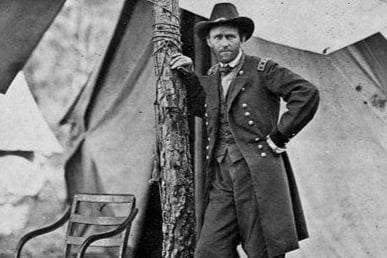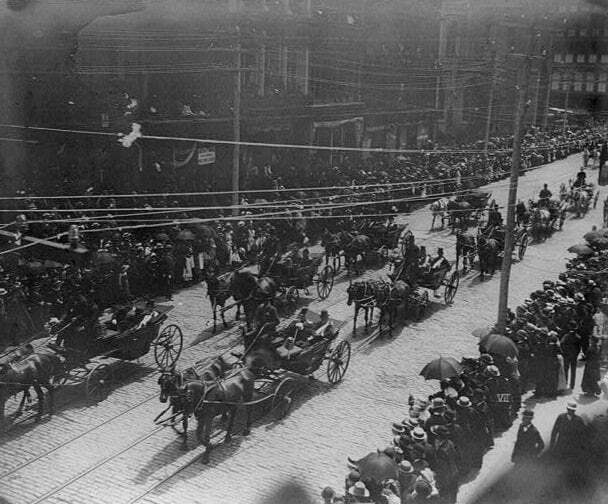Grant’s treatment of Jews during the Civil War
In 1862, General Grant issued General Orders No. 11, expelling Jews from a wide swath of Union-controlled land.

exc-63c1af87195e766d73bed6d9
General Ulysses S. Grant is best known for his role as the commander of the Union Army during the American Civil War and later as the 18th President of the United States. However, his legacy is not without controversy, particularly in regard to Grant’s treatment of Jews during his time as a military leader during the Civil War.
On December 17, 1862, Grant issued General Orders No. 11, which stated: “The Jews, as a class, violating every regulation of trade established by the Treasury Department, and also Department orders, are hereby expelled from the Department.”The exclusion area stretched from northern Mississippi to Cairo, Ill., and from the Mississippi River to the Tennessee River.
Grant’s possible motivation
The Union Army still needed cotton from the south so the cotton trade continued. It was difficult for U.S. General Ulysses S. Grant to enforce the rules intended to stop the illegal trading of cotton. He wanted to keep the traders from following his armies as he moved further into Mississippi. So he had to deal with cotton permits. Grant’s father, Jesse Grant, tried to take advantage of his son’s position. Jesse tried to obtain a permit for cotton trading for his colleagues, Harmen, Henry, and Simon Mack.
The Mack brothers were from a prominent Jewish family in Cincinnati that owned a clothing business. Jesse Grant agreed to take the Mack brothers to General Grant’s headquarters in Mississippi. Jesse wanted 25 percent of the profits gained from the cotton. General Grant was infuriated. He was angry that his father tried to take advantage of him. He was also angry at the Mack brothers for trying to reach him through his father. Grant denied the Mack family the purchasing permit and sent them back home. A few weeks later, Grant passed General Orders 11.
Throughout Grant’s life, he was often unable to strike back at “the lot of relatives who were always trying to use him,” It could have been easier for him to scapegoat the Jews, than confront his father whom he fear and detested.
Nevertheless, as historian John Y. Simon argued “Jesse Grant’s involvement in the cotton trade provides a psychological explanation for the order, though hardly a justification. Grant expelled the Jews rather than his father.”
Reaction
Grant’s subordinates immediately enforced the order in the area surrounding Grant’s headquarters in Holly Springs, Mississippi. Some Jewish traders had to trudge 40 miles on foot to evacuate the area.
In Paducah, Kentucky, military officials gave the town’s 30 Jewish families 24 hours to leave. None of them were speculators and at least two of them were Union Army veterans.
This order was met with widespread condemnation. Many saw it as a blatant act of religious discrimination. It was criticized as a violation of the Constitution’s guarantee of religious freedom.
Newspapers criticized Grant’s treatment of Jews, and Congress nearly censured him. Politicians, including President Lincoln, were bombarded by protests over Grant’s orders. Telegrams reached the White House from the Jewish communities of Chicago, New York and Philadelphia.
A group of Paducah’s Jewish merchants, led by Cesar Kaskel, sent a telegram to President Lincoln, condemning Grant’s order as an “enormous outrage on all laws and humanity, … the grossest violation of the Constitution and our rights as good citizens under it.” Meanwhile, Jewish leaders organized protest rallies in St. Louis, Louisville and Cincinnati.
Cesar Kaskel arrived in Washington on Jan. 3, 1863. He met with influential Jewish Republican Adolphus Solomons, then went with a Cincinnati congressman, John A. Gurley. This led to Kaskel meeting President Lincoln at the White House. Lincoln studied Kaskel’s copies of General Order No. 11 and the specific order removing Kaskel from Paducah.
Lincoln ordered Grant to revoke the order. Grant ended the order three days later.
Days earlier Lincoln issued the Emancipation Proclamation. Lincoln promised to not only rid the country of slavery but also to protect Americans from religious discrimination. He later stated he drew no distinction between Jew and gentile. “To condemn a class is, to say the least, to wrong the good with the bad,” he said.
Legacy of Grant’s treatment of Jews
By the time Grant ran for office in 1868, the order’s criticisms resurfaced. That summer, it became the biggest issue Grant had to deal with. The Democrats criticized Grant’s treatment of Jews during the war. Jewish leaders throughout the country sent anguished letters to him, seeking an explanation.
The furor reached a point where Grant had to respond. He leaked a letter stating that he issued the order without thinking. Grant said he had no prejudice against anyone, and it wouldn’t have been issued if he wasn’t under stress and rushed for time.
When Grant was elected to be President of the United States in 1868, he worked hard to correct his image. He selected, for the first time, a Jewish adviser (Recorder of Deeds for the District of Columbia Simon Wolf), appointed Jews to public office (including Edward S. Salomon, governor of Washington Territory, and Dr. Herman Bendell, superintendent of Indian affairs for the Arizona Territory). He also attended a three-hour ceremony for the opening of a synagogue in Washington, D.C.
He privately and publicly apologized for his actions. Although, he consciously excluded mentioning it in his famous Memoirs.
He boasted on his deathbed, that Jews were among those who visited him and prayed for his recovery. ”The Protestant, the Catholic, and the Jew appointed days for universal prayer in my behalf,” he boasted to his eldest son. Nevertheless, the memory of what his wife, Julia, called “that obnoxious order” continued to haunt Grant until his death in 1885.
Even though some Jews still held a grudge against him, many mourned his death. Jews were among the thousands of people along his funeral procession in New York City. They also appeared in large numbers at the dedication of his tomb.
During the election and his presidency, Jews’ public profile went up. Politicians finally began paying attention to the Jewish vote.
However, anti-Semetic sentiments began to rise after Grant’s Presidency ended. In 1877, the same year that Grant left the White House, his friend, banker Joseph Seligman was banned from the Grand Union Hotel after being labeled an “Israelite.” Across the United States, anti-Semitic restrictions and quotas led to a substantial decline in Jews’ social status.
In recent years, many historians have reevaluated Grant’s life. For many decades, public opinion on him suffered from the views of mostly prominent Southern historians. His image has improved. However, it’s still important to revisit Grant’s treatment of Jews. It’s a vital part of his legacy, once again proving that he was still a flawed human being.
Sources/Further Reading:
https://www.jewishvirtuallibrary.org/general-grant-s-infamy
https://www.nps.gov/articles/000/ulysses-s-grant-and-general-orders-no-11.htm
https://www.politico.com/story/2018/12/17/this-day-in-politics-december-17-1063364
https://www.theatlantic.com/national/archive/2012/03/the-anti-semitism-of-ulysses-s-grant/254607/
https://www.shapell.org/manuscript/ulysses-grant-antisemite-labelcivil-war-jew-orde-no-11/







1 thought on “Grant’s treatment of Jews during the Civil War”